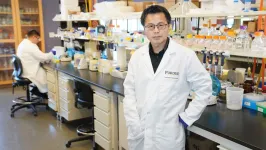(Press-News.org) International aid for pre-primary education has fallen further behind an agreed 10% spending target since the COVID-19 outbreak, according to new research.
The report, compiled by academics at the University of Cambridge for the global children’s charity, Theirworld, highlights “continued, chronic” underfunding of pre-primary education in many of the world’s poorest nations, after years of slow progress and pandemic-related cuts.
Early childhood education is widely understood to be essential to children’s successful cognitive and social development and to breaking cycles of poverty in poorer countries. In 2017, Cambridge research for Theirworld resulted in UNICEF formally recommending that 10% of education aid should be allocated to pre-primary education. Last year 147 United Nations member states signed a declaration agreeing to the target.
According to the new report’s findings, aid spending is falling far short of this goal and any progress towards the target ground to a halt following the COVID-19 outbreak. The most recent figures, from 2021, indicate that the proportion of education aid spent on pre-primary education internationally during the pandemic dropped by approximately (US)$19.7 million: from 1.2% to 1.1%.
The report identifies several reasons for the decline, notably spending cuts by the World Bank’s International Development Association, EU Institutions, and by the governments of wealthy nations, such as the UK.
Professor Pauline Rose, Director of the Research for Equitable Access and Learning (REAL) Centre at the University of Cambridge’s Faculty of Education said: “Hundreds of millions of children around the world are missing out on high-quality pre-primary education despite clear evidence that prioritising this will improve their life chances. The overall trend is very worrying.”
“Although some progress has been made towards the 10% target, it started from a very low base. Other education levels are still being prioritised amid a general decline in aid spending. International commitments to pre-primary education are good, but we need concrete action.”
The United Nations’ 2030 Sustainable Development Goals include the ambition to provide all children with proper childcare and pre-primary education. Over the past seven years, Theirworld and the REAL Centre have systematically monitored aid spending, tracking progress towards this goal.
The new report was compiled using the Organisation for Economic Co-operation and Development’s creditor report system, which gathers information about the aid contributions of both individual countries and international agencies such as UNICEF and the World Bank.
It shows that over the past two decades, the proportion of education aid spending that goes to pre-primary education has never exceeded 1.2%. Between 2020 and 2021, spending on the sector dropped from $209 million to $189.3 million: a decrease of 9.4%, compared with a 6.9% fall in education aid overall and a 0.9% decline in total aid spending. In 2021, aid spending on post-secondary education – the vast majority of which never leaves donor countries – was 27 times higher than that spent on pre-primary, despite widespread acknowledgement of the need to invest in the early years.
The report nevertheless also shows that the 10% target is attainable. UNICEF, which has consistently prioritised pre-primary education, spent 30% of its education aid budget on the sector in 2021. Italy increased spending from $2.6 million to $38 million. The majority of this was allocated to the ‘National Strategy on Human Resource Development’ which focuses on supporting the Jordanian government in strengthening its education system.
The research shows that pre-primary aid is highly concentrated from a few donors, leaving early childhood development in poorer countries particularly vulnerable to sudden fluctuations in those donors’ spending.
Much of the pandemic-induced drop in spending, for instance, occurred because the World Bank cut its investment in pre-primary education from $122.8 million to $70.7 million. Other donors, such as Canada, EU Institutions, France, Norway and the UK, also reduced spending in this area. In 2021, eight of the top 35 education donors allocated no funds to pre-primary education at all.
The UK’s contribution was lacklustre for the world’s sixth largest economy, due in part to the Government’s controversial decision to reduce overall aid spending from the UN-recommend target of 0.7% of Gross National Income to 0.5%. Between 2020 and 2021, its education aid spending dropped from $703.67 million to $584.95 million. Aid to pre-primary was particularly badly hit, falling from an already low $5.6 million in 2020 to just $1.8 million in 2021, equivalent to a mere 0.3% of its reduced education aid budget.
The report also shows that pre-primary education spending tends to be focused on lower-middle income countries rather than the very poorest nations. In 2021, just 15% of aid in this area went to countries classified as “low income”, while 52.7% was allocated to lower-middle income countries.
As a result, some of the world’s least-advantaged children have little prospect of receiving pre-primary support. Eritrea and Sudan, for example, received no pre-primary education aid in 2021. In many other poorer countries – such as the Central African Republic, Chad, Niger and Syria – the amount of aid per primary school-aged child was less than $5.
Rose said the finding pointed to the need for a model of “progressive universalism”, where those most in need receive a greater proportion of aid spending. “The biggest gaps are in the poorest countries, and particularly among the very poorest and least advantaged,” she said. “Increasing spending on pre-primary alone will not be enough. We also have to make sure those in greatest need are prioritised.”
The full report will be available on the Theirworld website.
END
Pre-primary education “chronically” underfunded as richest nations drift further away from 10% aid goal
New research shows proportion of international education aid for early childhood learning fell to just 1.1% post-pandemic, far short of an agreed 10% target.
2023-05-17
ELSE PRESS RELEASES FROM THIS DATE:
Confirming the safety of genetically edited allergen-free eggs
2023-05-17
Researchers have developed a chicken egg that may be safe for people with egg white allergies. Chicken egg allergies are one of the most common allergies in children. Though most children outgrow this allergy by age 16, some will still have an egg allergy into adulthood. Egg white allergies can cause a variety of symptoms, including vomiting, stomach cramps, breathing problems, hives, and swelling and some people with egg white allergies are unable to receive certain flu vaccines.
Using genome editing technology, researchers have produced an egg without ...
Otago researchers reveal impact of ancient earthquake
2023-05-17
By combining the scientific powerhouses of genetics and geology, University of Otago researchers have identified a new area of coastal uplift, which had been hiding in plain sight.
The previously unknown region of earthquake uplift, in Rarangi, Marlborough, was discovered using a combination of new data from laser mapping and kelp genetics.
Co-author Professor Jon Waters, of the Department of Zoology, says the study gives new insights into the changes in Aotearoa’s landscapes and the recent history of earthquake impacts.
“In a geologically well studied country like New Zealand, there ...
ESHRE publishes recommendations to tackle environmental threats to fertility and reproductive health
2023-05-17
Political and legislative action is urgently needed to respond to threats posed by the link between environmental factors and widespread infertility, says the European Society of Human Reproduction and Embryology (ESHRE) today (Wednesday).
This is one of the (8) recommendations outlined in a list of statements published by ESHRE for the first time. The aim is to draw attention to the growing threat from climate change, pollutants, hormone-disrupting chemicals, toxic substances, and other related risks.
The ...
What’s a park worth to the economy?
2023-05-17
A new framework developed by University of Waterloo researchers demonstrates the significant economic health savings and benefits from urban park investments.
In the first case study of its kind in Canada, researchers looked at Peterborough’s new Quaker Foods City Square park, which cost taxpayers $6.4 million, and have estimated the economic value of physical and mental health benefits that could come from it at more than $4 million per year. The framework considers the health savings associated with improved mental health and better air quality, the ...
New liquid biopsy method offers potential fornoninvasive Parkinson’s disease testing
2023-05-17
New liquid biopsy method offers potential for noninvasive Parkinson’s disease testing
EVtrap technology identifies proteins from brain cells in urine samples
WEST LAFAYETTE, Ind. – A team led by researchers at Purdue University and Purdue spinoff company Tymora Analytical Operations has developed a technique that may reveal signs of Parkinson’s disease in urine samples.
The technique gives researchers a chance to see if LRRK2 (leucine-rich repeat kinase 2) proteins, which are linked to Parkinson’s disease, and their downstream pathways are altered in samples from Parkinson’s patients. The method could eventually lead ...
GW to co-lead a new $20 million NSF AI institute
2023-05-16
WASHINGTON (May 16, 2023) - The George Washington University is co-leading a multi-institutional effort supported by the National Science Foundation (NSF) that will develop new artificial intelligence (AI) technologies designed to promote trust and mitigate risks, while simultaneously empowering and educating the public.
The NSF Institute for Trustworthy AI in Law & Society (TRAILS) announced on May 4, 2023, unites specialists in AI and machine learning with systems engineers, social scientists, legal ...
Discrimination, crime and suicidal thoughts associated with greater odds of firearm ownership among Black adults
2023-05-16
Black adults – particularly Black women – with higher levels of education and experiences of discrimination and crime are more likely to own a firearm, according to a study by the New Jersey Gun Violence Research Center at Rutgers.
In a new study appearing in the Journal of Clinical Psychology, researchers found that Black adults who endorsed firearm ownership were more likely to grow up in homes with firearms, had previously shot a firearm and planned to acquire a firearm in the coming year.
“The higher rates of firearm ownership among highly educated Black women were somewhat surprising to us,” said Michael Anestis, executive director ...
Some young cancer survivors face higher risk of premature heart failure
2023-05-16
Mean age at diagnosis of heart failure was 32 years old
First study to estimate risk of heart failure among young adult cancer survivors treated with this category of chemotherapy
Study raises awareness for patients, clinicians to monitor for heart failure symptoms, consider strategies for prevention
CHICAGO --- Imagine surviving cancer only to learn the drug that saved your life has introduced a completely different health risk: heart failure.
A new Northwestern Medicine study has found young adult cancer survivors (between 18 and 39 years old at diagnosis) were at higher risk (2.6 times) of heart failure when treated with anthracyclines, a specific category ...
New research sheds light on how shift work may influence fertility
2023-05-16
Only four weeks of shift work-like patterns in female mice are enough to disrupt their biological clock and reduce fertility, according to research presented at the 25th European Congress of Endocrinology. The findings help scientists better understand how circadian disturbances impact female fertility, which could eventually lead to future prevention strategies for women working in non-standard work schedules.
The circadian rhythm is generated by the body’s internal clocks which are synchronised to a 24-hour period, mostly by changes in light across days. These clocks regulate various biological functions and processes, including the sleep-wake cycle, ...
Drs. Dawn Hershman and Primo Lara elected group co-chairs-elect of SWOG Cancer Research Network
2023-05-16
The board of governors of the SWOG Cancer Research Network has elected Primo N. Lara, Jr., MD, and Dawn L. Hershman, MD, MS, as group co-chairs-elect. The two will serve in that capacity until the term of the current group chair, Charles D. Blanke, MD, ends in spring 2025. They will then begin a six-year term as SWOG’s first group co-chairs.
In a joint statement, Hershman and Lara said, “We both understand that the success of SWOG has been fundamentally anchored in collaborative interdisciplinary team science. We are convinced ...
LAST 30 PRESS RELEASES:
Tiny bubbles, big breakthrough: Cracking cancer’s “fortress”
A biological material that becomes stronger when wet could replace plastics
Glacial feast: Seals caught closer to glaciers had fuller stomachs
Get the picture? High-tech, low-cost lens focuses on global consumer markets
Antimicrobial resistance in foodborne bacteria remains a public health concern in Europe
Safer batteries for storing energy at massive scale
How can you rescue a “kidnapped” robot? A new AI system helps the robot regain its sense of location in dynamic, ever-changing environments
Brainwaves of mothers and children synchronize when playing together – even in an acquired language
A holiday to better recovery
Cal Poly’s fifth Climate Solutions Now conference to take place Feb. 23-27
Mask-wearing during COVID-19 linked to reduced air pollution–triggered heart attack risk in Japan
Achieving cross-coupling reactions of fatty amide reduction radicals via iridium-photorelay catalysis and other strategies
Shorter may be sweeter: Study finds 15-second health ads can curb junk food cravings
Family relationships identified in Stone Age graves on Gotland
Effectiveness of exercise to ease osteoarthritis symptoms likely minimal and transient
Cost of copper must rise double to meet basic copper needs
A gel for wounds that won’t heal
Iron, carbon, and the art of toxic cleanup
Organic soil amendments work together to help sandy soils hold water longer, study finds
Hidden carbon in mangrove soils may play a larger role in climate regulation than previously thought
Weight-loss wonder pills prompt scrutiny of key ingredient
Nonprofit leader Diane Dodge to receive 2026 Penn Nursing Renfield Foundation Award for Global Women’s Health
Maternal smoking during pregnancy may be linked to higher blood pressure in children, NIH study finds
New Lund model aims to shorten the path to life-saving cell and gene therapies
Researchers create ultra-stretchable, liquid-repellent materials via laser ablation
Combining AI with OCT shows potential for detecting lipid-rich plaques in coronary arteries
SeaCast revolutionizes Mediterranean Sea forecasting with AI-powered speed and accuracy
JMIR Publications’ JMIR Bioinformatics and Biotechnology invites submissions on Bridging Data, AI, and Innovation to Transform Health
Honey bees navigate more precisely than previously thought
Air pollution may directly contribute to Alzheimer’s disease
[Press-News.org] Pre-primary education “chronically” underfunded as richest nations drift further away from 10% aid goalNew research shows proportion of international education aid for early childhood learning fell to just 1.1% post-pandemic, far short of an agreed 10% target.




